Everyday life is full of risks and challenges, and at Little Scholars, we believe children need opportunities to develop the skills associated with managing risk and making informed judgements about risks from a very young age. Risky play helps to develop important life skill learnings such as; building resilience and persistence, critical-thinking skills, self-confidence and even extends their frustration tolerance.
We get it—no one wants to see little ones get hurt. It’s almost instinctual to hover nearby in case they stumble or to call out ‘be careful!’ when they’re taking risks. But could this actually be sending the message that we don’t trust their capabilities or instincts? Historical trends show that since the 1960s, there’s been a shift in how we view children. Once considered competent, responsible, and resilient, the modern perspective leans more towards constant supervision and protection. What used to be unrestricted and often unsupervised outdoor play has transitioned to structured, closely watched, and frequently indoor activities.
A lot of research has been devoted around the world to risky or adventurous play, and how parental attitudes as well as other factors played a part in children’s activities.
By participating in adventurous play, children are more likely to engage in activities that elevate their heart rate and breathing, leading to increased energy expenditure. This can help children meet the recommended guidelines for MVPA, which is at least 60 minutes of moderate-to-vigorous physical activity daily.
‘Educators facilitate gradual exposure to controlled risks, allowing children to develop confidence and judgment, ultimately empowering them to make informed decisions when navigating different situations.’
-Kristen Guymer
Adventurous play also offers opportunities for children to develop and enhance their motor skills, coordination, balance, and strength. These physical skills are essential for overall physical development and can contribute to improved physical fitness.
Furthermore, adventurous play provides children with opportunities to explore their environment, take risks, and challenge themselves. This type of play promotes creativity, problem-solving, and decision-making skills, as children navigate and overcome obstacles. It also fosters a sense of adventure, independence, and self-confidence.
Overall, adventurous play can be a fun and engaging way for children to meet their daily MVPA requirements while promoting physical fitness, skill development, and personal growth.
“We emphasise the importance of careful observation, encouraging children to identify potential hazards by looking, listening, and even touching when safe,” she says. “Educators also foster critical thinking by asking questions that prompt risk assessment, such as, ‘What could go wrong if…?’ We promote collaboration and communication, allowing children to discuss and share their perceptions of risk.”
Furthermore, Kristen shares, educators facilitate gradual exposure to controlled risks, allowing children to develop confidence and judgment, ultimately empowering them to make informed decisions when navigating different situations.
Before embarking on Bush Kinder experiences or similar activities, educators guide children through risk assessments:
Hayley Yates, a lead educator at our Yatala campus agrees that discussions with children previously help prepare for and mitigate risk.
“We support risky play through our discussions with the children,” Hayley says. “If it’s something that has a big risk, example climbing trees, we talk about what we should look out for when climbing, how big the branches need to be to be safe and things of that nature. For both the younger and older children we use language like ‘Notice how this is this? Another example would be walking on slippery rocks, I would say ‘notice how that rock is wet? That might be slippery’, then giving them the option to continue to that rock or a different one.”
Hayley says through important discussions educators are guiding children by asking questions and role modelling safe behaviours.
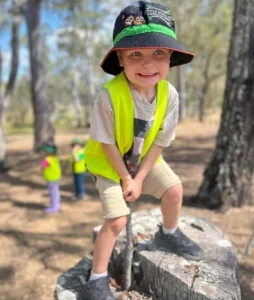
At Little Scholars, we believe that spending time in nature has numerous benefits for children, including improved physical health and strength, enhanced cognitive development, and better emotional regulation. Through our Bush Kinder program, children have the opportunity to connect with nature on a deep level, learn about the environment, be challenged beyond the classroom, and engage in meaningful, hands-on experiences.
During our Bush Kinder sessions, children have the opportunity to engage in a range of activities, from nature walks and bird watching to building shelters and learning about indigenous culture. Children climb, scramble, jump and more in nature’s playground.
In this natural environment, children encounter diversity, novelty, challenges, and even some calculated risks. Their senses come alive as they engage with sticks, tree holes, water, rocks, sand, and dirt—nature’s abundant toys.
Our Bush Kinder educators are highly experienced and qualified in outdoor education and child development. They are passionate about providing children with meaningful learning experiences in a safe and supportive environment. We take the safety and security of our children very seriously. Our Bush Kinder program is conducted in a safe and secure outdoor environment, with strict protocols in place to ensure the well-being of all children.
But risky play is not limited to bush kinder.
Our outdoor areas are thoughtfully designed, including forts and equipment, all with intention of helping children navigate risk, endure challenges and build motor and fine motor skills.
Helena Vairy, an educator at our Ormeau Village campus, shares an example of how she helps children assess risk and how to complete ‘risky’ tasks safely.
“The way I like to teach children to access risk are by providing them with the materials which are needed and seeing how the children act on these,” Helena says. “
“The other week myself and a couple of the Kindergarten children set up the sandpit I placed the crates in a line and stacked one on top of the other. One child Mahli said ‘this looks like a runway maybe we can walk and then jump off the crates.’ What a great idea this was, the children were nervous at first but I stood right next to them to help. I asked the children, ‘do you think you can jump off the crated and land with your feet flat?’ I then demonstrated and the children too were off jumping.
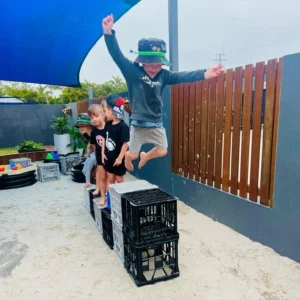
We love this story because it shares how children lead their own learning experience, consider risks, and support and encourage each other.
All of our campuses have recently introduced woodworking stations, designed to help children exercise their creative and critical thinking skills. It allows them to express their ideas and figure out solutions to their projects. It’s also a great way to introduce risky play, as the risks are managed and educators are actively supervising, but woodworking teaches children about safety and understanding risk.
“As they pick up their hammers, they’re getting ready to work on their pincer grip,” says Katie, educational leader at our Parkwood campus. “Things like that prepare them for school. In order to prepare to help the children use these safely, we’ve been having group discussions and asking them different questions about how to use the tools, what they think the tools do and what they can make in the future.”
It’s clear that risky play isn’t just about letting children run wild; it’s a calculated approach to help them develop essential life skills. At Little Scholars, we’re not just about keeping your little ones safe; we’re about preparing them for life. Our educators are trained to guide children in assessing risks, making it a learning experience that builds confidence and safe judgment. So, parents, it might be time to loosen the reins a bit. Let’s trust our children to make informed decisions, even if it means resisting the urge to shout, ‘Be careful!’ every so often. After all, life is full of risks and challenges, and what better time to learn how to navigate them than in the formative early years? You’ll be amazed at what they can achieve when given the freedom to explore, assess, and conquer.
We know you want to give your child the best possible start in life. We foster nurturing relationships between our educators and your child, building and gaining their trust so we can support your child as they take on risks and challenges safely and confidently. Book a tour today to get started!
Further reading:
If you follow our social media posts, you know we’re passionate about getting our Little Scholars outside. Have you ever wondered why outdoor play is such a vital part of our early educational program?
Imagine the fresh air brushing against your face, the satisfying crunch of leaves under your feet, or the soothing sound of a nearby burbling stream. Picture the invigorating scent of freshly cut grass or the refreshing breeze of the salty sea air. Envision the tactile sensation of rough bark or smooth stones. And finally, visualise the breathtaking beauty of greenery, rivers, streams, and oceans.
In essence, being outdoors offers the ultimate sensory experience that simply cannot be replicated in a studio.
Many of us cherish childhood memories filled with boundless hours spent exploring the great outdoors. However, as life has grown busier for families, children today are spending less time engaging in unrestricted play outside. A recent study by Royal Children’s Hospital national child health poll found that 45% of Australian children play outdoors most days, and 80% of parents would like their children to spend more time outdoors. At Little Scholars, we want children to rediscover the joy of unstructured play in nature.
One study found that children who engage in just one third more outdoor activities than their peers grow up to be happier adults.
Outdoor learning should be an integral part of children’s everyday lives, providing fun and enjoyment while also serving as a stimulus and extension of their indoor learning. If your child attends Little Scholars, outdoor play is a key component of their daily experience on our campus.
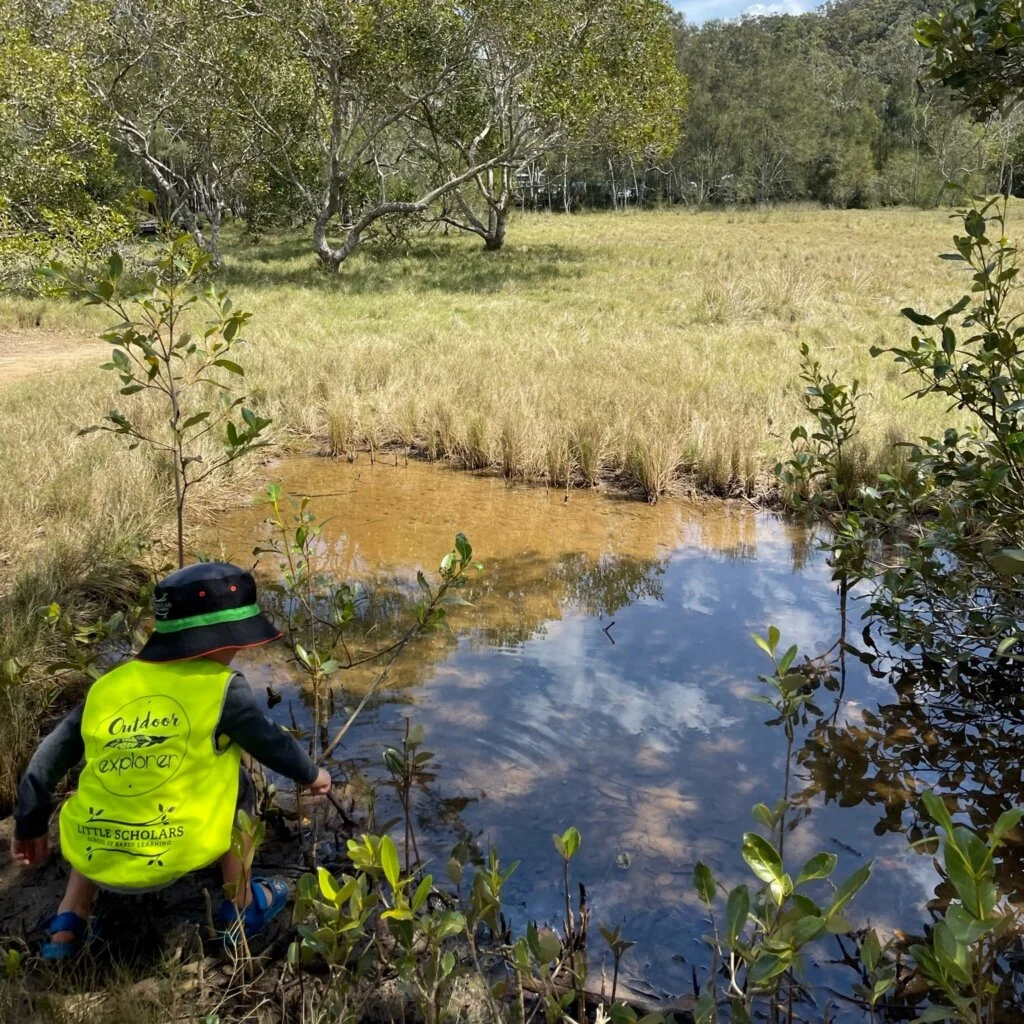
At Little Scholars, our educational programming places a strong emphasis on the natural environment. We have developed the Little Scholars’ Bush Kinder program, an innovative outdoor education experience for children of all ages, fostering exploration, discovery, and learning in nature.
During our Bush Kinder adventures, children engage in a range of activities, including nature walks, wildlife watching, building shelters, and learning about indigenous culture. They climb, scramble, jump, and fully immerse themselves in nature’s playground.
Our outdoor teachers are highly experienced and qualified in outdoor education and child development. They understand the significance of outdoor and nature play in fostering children’s development and well-being. By cultivating a love for nature and the environment, as well as a connection to all living things, they help fulfill children’s basic needs for freedom, adventure, experimentation, risk-taking, and simply being children.
At Little Scholars, the safety and security of our children are of utmost importance. Our Bush Kinder program is conducted in a safe and secure outdoor environment, with strict protocols in place to ensure the well-being of all participants. Our educators are passionate about providing children with meaningful learning experiences in a safe and supportive setting. Extensive risk assessments are conducted prior to excursions, but children are also advised and included in risk assessing while on their adventures so they can begin to think about safe risk taking while enjoying being outside. Our Bush Kinder program is designed to be fun, engaging, and educational, and there are plenty of benefits for children while they’re out on their adventures.
Children have the opportunity to explore and discover the wonders of the natural environment, learning about plants, animals, and ecosystems firsthand.
Through hands-on experiences, children develop critical thinking and problem-solving skills. They learn to navigate challenges and find creative solutions.
Outdoor play provides ample opportunities for children to interact with their peers, fostering the development of social skills and the formation of new friendships.
Engaging in outdoor activities helps children develop their physical skills, such as coordination, balance, and strength.
During bush kinder, we engage in Dadirri, an Aboriginal word meaning ‘inner deep listening and quiet still awareness and waiting’. So while out enjoying nature, the children and educators sit with a bit of space from each other and pay close attention to what they can hear, see, smell and feel. Bush kinder also provides an opportunity to learn, acknowledge, and celebrate the history and traditions of the people who were the traditional owners of the land they love to spend time exploring.
Finally, spending time in nature cultivates a sense of wonder and deepens children’s appreciation for the natural world around them.
While we take pride in our learning programs that prioritise outdoor play, it’s important to acknowledge the foundations upon which these programs were built. Our teams have conducted extensive research and drawn from the following theories:

Friedrich Froebel (1782-1852): Froebel’s approach emphasises holistic development and creativity in early childhood education. He recognised the importance of outdoor learning, nature walks, and gardening.
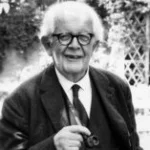
Jean Piaget (1896-1980): Piaget’s theory of cognitive development highlights the role of play in intelligence development. He believed that children’s play and environment should encourage cognitive and language growth.

Lev Vygotsky (1896-1934): Vygotsky emphasised the importance of children’s interaction with the environment and their peers. He believed that learning is enhanced through social interaction and scaffolding from a more knowledgeable other person.
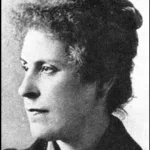
Margaret McMillan (1860-1931): McMillan, along with her sister Rachel, played a pivotal role in nursery education. They advocated for open-air nurseries and opened Britain’s first open-air nursery, and unlimited outdoor play, recognising the benefits of hands-on experience and active learning.
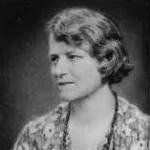
Susan Sutherland Isaacs (1885-1948): Isaacs, an educational psychologist, believed in the central role of play in a child’s education. She emphasised the importance of outdoor exploration and community engagement to support children’s emotional and cognitive needs.
While our Bush Kinder program is a significant aspect of Little Scholars, outdoor play doesn’t always require leaving the campus. Our yards are purposefully designed as extensions of our studios, providing space for learning, relaxation, and play. From play forts to bike tracks, gardens to sensory paths, and water play areas, our outdoor environments offer open and less structured spaces for children to explore, overcome challenges, and grow.
By encouraging children to spend time outdoors, whether through Bush Kinder or within our incredible yards, we aim to provide them with a well-rounded early education. Outdoor play nurtures essential skills such as resilience, teamwork, creativity, mindfulness, and risk assessment in a safe and supervised environment.
Now that you understand why outdoor play is such an integral part of the Little Scholars experience, it’s time to discover how nature play can bring out the best in your child. Find out more by booking a tour and seeing firsthand our commitment to supporting children’s growth and development.
Let us hold your hand and help looking for a child care centre. Leave your details with us and we’ll be in contact to arrange a time for a ‘Campus Tour’ and we will answer any questions you might have!
"*" indicates required fields
Let us hold your hand and help looking for a child care centre. Leave your details with us and we’ll be in contact to arrange a time for a ‘Campus Tour’ and we will answer any questions you might have!
"*" indicates required fields